#labdacides
Explore tagged Tumblr posts
Text
antigone with a cane because inheriting the house curse also means inheriting the physical manifestation of the curse (ie. the disability of oedipus, laius and labdacus). she cannot avoid being her father’s daughter (and does she even want to avoid it ?)
8 notes
·
View notes
Text
I love you Polydorus, I love you Labdacus, I love you Laius, I love you Oedipus, I love you Eteocles and Polynices, I love you Antigone, I love you Ismene, I love you Labdacids 💖
#ο θεός μίλησε#my favorite family#literally they’re the best ever your faves could NEVER!!!!#honorary mention to Jocasta and Creon who I also love love love#but they aren’t labdacids so yeah#especially Laius#he’s my specialest guy
1 note
·
View note
Text
also Antigone line 1175 (Αἵμων ὄλωλεν: αὐτόχειρ δ᾽ αἱμάσσεται - "Haimon has perished, bloodied by his own/a kindred hand") is so insane because ok, the messenger is announcing Haimon's death, but of course Haimon's name means "blood" and so the line can just as well be translated as "the bloodline has perished, bloodied by its own/a kindred hand"
which obviously is true because Antigone and Haimon have killed themselves and with them has died any possibility of offspring - a complete extirpation of the Labdacid line. but also Eteocles and Polynices have killed each other, each of them killing his brother by a kindred hand (αὐτόχειρ). but then of course their father Oedipus killed his father Laius with a kindred hand. and then when we think that a consistent element of Attic marriage iconography is the groom taking the bride by the hand, we might wonder if perhaps αὐτόχειρ even hints at Oedipus taking his own mother as his bride. and that's not to mention the attempted killing of Oedipus by his parents at his birth - the bloodline would have perished αὐτόχειρ, only that it didn't, and then it did again and again and again
48 notes
·
View notes
Text
chrysippos at the crossroads between the curse of the atreidai and the curse of the labdacids…
#his story is just. sad! he doesn’t even perpetuate the cycle of violence he’s just its victim#house of atreus#chrysippos#chrysippus#iphis.txt#h
0 notes
Text
just read the seven against thebes to try and figure out the dynamics of the twins' deaths and there is absolutely no mention of any specific wound, which is only fuelling my polynices jesus-coded fever dream of giving him a spear stab wound in the ribs
#tagamemnon#antigone#not really antigone that's just my labdacids tag#might fuck around and make some fanart
9 notes
·
View notes
Text
i have to believe that euripides' decision to elide polydorus (only son of cadmus, father of labdacus and grandfather of laius) from the bacchae, making cadmus' line and the royal house of thebes extinct with the death of pentheus and the exile of cadmus, was to spite sophocles and his history of writing successful and popular plays about the labdacids
#i'm not sure if we know what prizes antigone and oedipus at colonus won#but the selection of the plays that survive in complete form was not random so...#i think i wrote an exam essay once about why he might have done that#iirc it was about how it makes the ruin more complete and heightens the stakes for cadmus#but i think this was the real reason#mine#bacchae liveblogging
19 notes
·
View notes
Text
je n'ai pas fermé les yeux seulement, dans mon cœur cette porte entre ouverte l'éclatement des yeux le sang dans mes paupières l'aveuglement et presque
alors, presque les larmes...? presque les larmes, presque les larmes... je devrais pleurer
on vient de m'annoncer m'annoncer calmement "vous vous êtes fait violer"
devrais je me taire ? mais bon, je le savais je suis pas trop choquée
tu devrais pleurer toutes les larmes de ton corps tu devrais pleurer tes yeux hors de leur poche tu devrais hurler contre le sable humide tu devrais te rappeler les nuits des labdacides
la plage pleine de fossile, qui comprend ton chagrin les roches ont vu passer des victimes de cette mort les roches très ancienne qui comme tes souvenirs
incrustées de fossiles de cadavres de pierre de souvenirs perdus étouffés dans l'argile sculpté dans tes paupières l'argile dont tu es faite, coule très lentement révélant les souvenirs pointant hors de la terre pointant hors de ton œil le sang, l’eau, coule de la plaie, que le souvenir creuse
saisis donc la pierre plantée ? pas vraiment non plutôt, ressortant de la chair, après plusieurs années de tes cheveux
extrait le souvenir rince les bouts de terre séchée,
le souvenir du viol une nuit d'avril
le viol de tes ancêtres, le viol de ton aînée, cette tragédie longue, et lente, cette tragédie saignante
les femmes les femmes bien habillées, et leurs boucles aux oreilles se sont elles fait violer, elles aussi ? en ces nuits douces, d'avril
te rappelles tu ce jour d'avril, justement ce jour ou sous un arbre, face au sang dans ton lit tu as crié si fort que ta langue s'est ouverte
de ta langue a coulé tout le sang retenu
ce très lent sortilège qui hante cette chambre, ce lit contre la fenêtre bleu, blanc bleu, gris, rouge foncé noir, mais le sang dans mes yeux m'a voilé cette scène
d'elle je ne me rappelle que l'avant et la suite les vomissements et fissures qui m'ont empli le ventre il m'embrasse et me sert me dit souriant,
je t'aime
et je sors en courant vomir toute mes peurs, pleurer et me lever
je passe une seconde coincée entre la chambre et l'escalier face au miroir
jaune blanc beige orange et rouge le long de mes lèvres, le orange les cheveux mal coupés, les cernes sous mes yeux
le vomi dans ma bouche je me regarde dans mes propres yeux vides mais qu'est ce qui se passe ?! mais qu'est ce qui se passe ?! ! enfin,
je dormais, je crois, je dormais, je crois, je dormais, je pense, je courais, je crois, je parlais, je crois, je l'avais, ses mains, je sa main, la mienne, nos doigts son dos, le miens ?! son dos ?! Non !!! Non, je crois, je je crois, je je crois, je pense pas, je - vomissures!!!!! nausée, surtout, la peur elle me fera courir, contre l'escalier bleu oublier les raisons, et protéger mon cœur protéger mon esprit, enfermer tout au fond
au fond de mon cerveau, ces mémoires de souffrance ce corps figé et vide, les doigts qui en ressortent la langue qui le parcoure et les doigts qui y entrent ce corps figé et vide, qui obéis sans peine, car il ne fonctionne plus,
il s'est tué tout seul
ses doigts longs dans les tiens, ses doigts longs dans ta bouche ces deux très jeunes personnes
qui se volent et se tuent il me viole et me tue
tu ne te rappelles pas, mais ton corps lui le sait
se rappelle du début, de la fin de ce crime le milieu compte peut être, c'est la nausée qui m'ébranle je me coupe les cheveux
et remonte dans la chambre je meurs contre ce lit, je ne me relève pas j'ai laissé dans cette chambre enfoui contre le lit
tout le sang de mes règles
8 notes
·
View notes
Photo
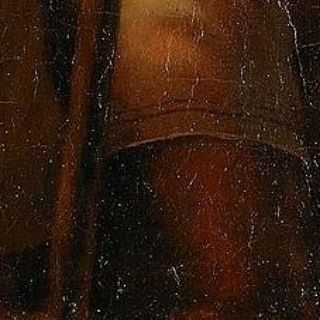
[PARTIE I: LAÏOS, LE MAUDIT] . (I.1) Laïos (ou Laïus) est le fils de Labdacos, qui descend d'une lignée prestigieuse que l'on nomme les “Labdacides” dont les origines remontent à Cadmos, fondateur de Thèbes, débutant sa tragique lignée avec Harmonie. Parmi cette funeste descendance, n'en citons que quelques noms tels que Ino, Agavé ou encore la pauvre Sémélé, dont Zeus en fut l'amant et la tua en prenant sa Divine apparition devant ses yeux la condamnant à brûler vive, laissant par chance leur enfant Dionysos épargné par les flammes, né dans les souffrances des brûlures de sa mère au grand désarroi de Héra, femme légitime et jalouse de Zeus, Déesse protectrice du mariage, instigatrice de cette félonnerie. . Mais pour l'heure, revenons à Laïos, arrière-arrière petit-fils de Cadmos. Il n'a que un an lorsque son père, Labdacos, meurt. Thèbes ayant été dérobé par la tyrannie de deux hommes, l'enfant est exil�� pour sa sécurité. C'est à Élide, auprès du Roi Pélops, que le garçon est conduit. Les années passent et Laïos est à présent un jeune homme de 19 ans. Le Roi Pélops confie l'éducation de son jeune fils préféré encore enfant à Laïos, dont il devient le tuteur. . C'est le début d'une bien terrible histoire… . #mythologies #grèce #mythologiesgrecques #laios #thebes #labdacides #œdipe #antingone #sophocle #anouilh #créon #elide #bookstagram #booksofintagram #legende #mythes #tragédie #oracle #dieuxgrecs #laios #ismene #polynice #eteocle #pelops #chrysippe #destin #malediction #delphes #merope #polybos (à Élide) https://www.instagram.com/p/CLKNMJ2FmNq/?utm_medium=tumblr
#mythologies#grèce#mythologiesgrecques#laios#thebes#labdacides#œdipe#antingone#sophocle#anouilh#créon#elide#bookstagram#booksofintagram#legende#mythes#tragédie#oracle#dieuxgrecs#ismene#polynice#eteocle#pelops#chrysippe#destin#malediction#delphes#merope#polybos
1 note
·
View note
Text
from Antigone
By Sophocles, Translated by Frank Nisetich
CHORUS: I see how of old the pains of the Labdacid house pile upon the pains of the dead, nor does one generation let the next one go, but some god topples it, too, and there is no deliverance. For just now over the last root in the house of Oedipus the light of salvation was spreading. The bloody knife of the gods below— folly of words and Fury in the mind— reaps it away in its turn.
0 notes
Text
Two tyrants: Sophocles’ Oedipus and Herodotus’ Periander
“In a classic article, ‘From Oedipus to Periander: lameness, tyranny, incest in legend and history’, published more than three decades ago in Arethusa,1 Jean-Pierre Vernant focuses on what he calls the ‘strange parallelism in the destiny of the Labdacids of legendary Thebes and of the Cypselids of historical Corinth’.2 The basic similarities in the infancy stories of Oedipus and Cypselus are well-known. Both are nearly killed shortly after their birth on the orders of people who, according to a prophecy, are doomed if the baby grows to manhood; yet in each case the killers shrink from the murder out of pity for the child, thereby allowing the prophecy to be fulfilled.3 Oedipus and Cypselus’ son Periander are both involved in struggles within the family, in Periander’s case with his son, in Oedipus’ with his father; Vernant daringly assimilates the punishments that they both inflict as a result of these conflicts.4 Both Periander and Oedipus engage in devi-ant sexual behaviour.5 And both families are associated with lameness: Cypselos is the son of Labda, Oedipus the grandson of Labdacus, and both these names derive from the archaic letter lambda which had one ‘leg’ shorter than the other.6 Labda in Herodotus is specifically said to be lame, and Oedipus’ ‘swollen feet’ as a result of their piercing when he was a baby must be an old feature of his story, built as it is into his very name.7 Vernant uses these connections to argue that ‘in the Greek “imagination” the figure of the tyrant, as it is sketched out in the fifth and fourth centuries, adopts the features of the legendary hero, at once elect and cursed . . . Despising the rules which preside over the ordering of the social fabric . . . the tyrant . . . incarnates in his ambivalence the mythic figure of the lame man’.8
Vernant shows little interest, however, in the instantiations of the myth in the literary works which, together with the pictorial record, provide our sources for ancient Greek mythology. He sometimes takes details crucial to his argument from texts centuries apart, without considering whether such an approach might be problematic; 9 and although sometimes a later source preserves evidence for an earlier version, the possibility must always be considered that the detail in question results merely from later elaboration.10 There are exceptions to this tendency – Vernant emphasises, for example, that Periander’s sleeping with his mother is preserved in a later source and so cannot be considered part of Herodotus’ tale.11 But when dealing with the Oedipus myth in particular he culls details from many places without showing interest in any particular version, not even the most famous one, by Herodotus’ contemporary Sophocles, who is mentioned only once in the entire paper, and that in passing.12
In this chapter I will be focusing not on some original or primary version of either myth, but on a more modest goal: on the presentation of the myth in Sophocles and Herodotus, and in particular on something that Vernant does not mention, the issuing of a solemn proclamation of excommunication by Oedipus and by Periander. This element of both stories shows remarkable similarities; equally there are crucial differences, and reflecting on these can help to bring out the authors’ distinct literary aims.13″
Finglass, P. J. (2018). Sophocles’ Oedipus and Herodotus’ Periander. In E. Bowie (Ed.), Herodotus. Narrator, Scientist, Historian (pp. 59–75). (Trends in Classics Supplements; Vol. 59). Walter de Gruyter GmbH. https://doi.org/10.1515/9783110583557-004
Sourcewith the whole paper: https://research-information.bris.ac.uk/ws/portalfiles/portal/153078571/Oedipus_and_Periander.pdf

Patrick Finglass, MA, DPhil (Oxon.)
Henry Overton Wills Professor of Greek, Department of Classics and Ancient History, University of Bristol
1 note
·
View note
Photo

KARAOKÉ 🧚🏽♂️ PANDORE « De braises abruptes et sans lendemain, Je dévidais bobine, suivais mon mou chemin, Il faisait nuit, il faisait noir, Plus m’approchais, plus me sentais lointain, Il faisait jour, il faisait soir, Mais j’étais pas certain. Au Temple Fumoir – Karaoké Pandore, Théâtre magique, seulement pour les fous Ce furent des somnolences, grisant, comme des paratonnerres, d’encore, Et des intempérances comme des coups de boutoir. Tous revenaient la voir, et puis s’empoisonner et de fées vertes et de blés noirs, Labdacides et contristés, boitant, boitant, boitant encore dans cette mélopée, Ce carousel de louves sans portes dérobées Où les sirènes et les serveurs chantaient au débotté : « Des traces d’amour Sur d’anciennes maîtresses, ma sœur Des races d’étreintes Sur d’ici-bas prêtresses, mon cœur Viennent les orages comme les rumeurs » Et je ne sais plus si j’ai inventé ce refrain, En quatre temps, ou en cinq actes. Son bas à elle, Keishi le remontait, Moi beau Baal je lui balbutiais… Gestes barrières vains, tragi-comiques, Loin des baisers colombins et des fables en hic. Une gorgone, Keishi, au magnétisme noir, Dont la douleur vous pétrifiait d’égards. Pisse-lyre, je lui bissai Que tous les hommes voulaient l’avoir: « La rencontre des yeux, Des je t’aime parjures Qui n’auront pas lieu, Des cocktails drogue dure Puis la poudre aux yeux Qui rien d’bon n’augure Éteignent nos cieux » Poème inspiré de l’artwork de @chaussetteb 🙏 Chaussette B is a pseudonym of a Hong Kong-based visual artist. She worked professionally in the fashion industry in Paris and Hong Kong for 15 years before she picked up the camera for the first time in 2016. Nude and Portrait photography became a portal into which she took her first steps as an artist. Her - what she has termed - paintography process is the combination of a large score of photographs, captured mainly in her own studio with nearby objects, textures, parts of her own body, and orchestrated digitally. Chaussette B. will be exhibited at UNEXPECTED BEAUTY - Art exhibition at La Galerie from April 28 to May 2! Keshi, Variation en miroir, Hong Kong 2020 #sauvespourlebac #sauvesparlekong #sauvepourlebac (à Gros-Caillou, Paris, France) https://www.instagram.com/p/CcpYgFiLJDP/?igshid=NGJjMDIxMWI=
0 notes
Photo





Entre une Sphinge dévoreuse de héros, un garçon valeureux, parricide malgré lui, un inceste consommé et fertile, et la guerre fratricide que se livrent les Labdacides, l’antique cité grecque de Thèbes est le théâtre d’une tragédie et de drames dont une jeune fille semble vouloir sa part. La vie d’Antigone est-elle prédestinée à une telle fatalité ?
Alors que le sang des Labdacides, de la lignée du grand-père d’Œdipe, Labdacos, n’a de cesse de se répandre, Antigone, envers et contre tous, décide de ce qui est sa loi. Histoire de l’émancipation d’une femme, Fille d’Œdipe cherche à interroger sur le sens du sacrifice. Éduquée à tenir son rang et sa place, Antigone se rebelle. Elle refuse la loi du tyran Créon et s’accroche jusqu’aux portes du tombeau à son orgueil. Dans quelle mesure ce chemin n’est-il pas justement celui qui était attendu par tous ? La place qui lui était socialement assignée (le pratico-inerte œdipien) ne porte t-elle pas en elle les germes du destin tragique d’Antigone ? Devenir sainte ou martyre, voilà ce que son père lui a laissé comme héritage. Comment se défaire d’un tel poids ? Récit féministe sur la liberté individuelle et le rejet de toute ingérence patriarcale, Antigone nous pose deux questions essentielles : la sororité, solidarité entre les femmes, est-elle une réponse globale possible à la domination masculine ? Et la Justice des Hommes existe-t-elle vraiment ?
FILLE D'OEDIPE par Marie Gloris Bardiaux-Vaïente & Gabriel Delmas Collection Blanche - 64 pages - Format 23x31 cm - Noir et blanc ISBN 978-2-35212-139-8
Paru le 16 mai 2018
#mythologie#mythe#antigone#athena#comics#bande dessinée#roman graphique#graphic novel#Marie Gloris#gabriel delmas#6pieds sous terre#récit#sororité#féminisme
19 notes
·
View notes
Photo

Heureux sont ceux qui, du malheur N'ont pas connu, leur vie durant, le goût!
Comme quand la houle du grand large, Remue les fonds les noirs limons, Soulevée par les vents de Thrace, Elle roule à l'assaut du rivage.
Heureux sont ceux qui, du malheur N'ont pas connu, leur vie durant, le goût!
Sur la maison des Labdacides Je vois dès l'origine s'abattre le malheur, Un mal qui sans relâche aucune Frappe les morts et les vivants.
Heureux sont ceux qui, du malheur N'ont pas connu, leur vie durant, le goût!
Celui chez qui se glisse Le leurre de ses désirs déments Ne sort de l'ignorance que lorsque sous ses pieds Brûle déjà le feu.
Heureux sont ceux qui, du malheur N'ont pas connu, leur vie durant, le goût!
2 notes
·
View notes
Text
ANTIGONE
[PRÉAMBULE] Un vieil homme aveugle chemine le long d'une route accompagné d'une jeune femme à l'allure fière. Ils sont les sujets de railleries et de pitié tout au mieux, ou reçoivent quelques projections ainsi que d'immondes insultes, au pire.
.
Il s'agit du vieil Œdipe, et de sa fille, Antigone.
.
Antigone.
La femme qui a dit non.
La femme qui s'est rebellée.
Antigone, l'audacieuse.
.
Mais pour bien comprendre la tragédie d'Antigone, la fascination qui a fait de cette femme, personnage mythologique dont nombre d'écrivains y usèrent leur plume, bons nombres d'artistes y érigèrent sculptures et tableaux, rivalisant au même titre qu'avec les récits des plus grands Dieux et Héros grecs tels que son père, Œdipe, il faut remonter bien avant l'histoire de ce dernier, aux origines de sa famille, et plus particulièrement à celui dont toute son histoire sera le début de ce destin brisé, son grand-père : Laios...
#mythologies#Grèce#Antigone#Créon#Sophocle#littérature#Théâtre#art#livres#books#culture#mythologies grecs#légende#labdacides#laios#Œdipe#Thèbes#feminist
0 notes
Text
Grosse flemme sur 2018 : top 15
Pas d’intro, puisque je vous dis que j’ai la flemme !

15. Everybody Knows (Asghar Farhadi)
Le grand maître iranien nous prouve avec ce film qu’il est tout à fait capable de transposer sa maestria du drame familial dans tous les contextes culturels. Amour, mensonges et trahisons, Everybody Knows pourrait être une telenovela grandiloquente si ce n’était cette précision magnifique que l’on connaît à Farhadi. Penelope Cruz est de plus en plus belle à mesure qu’elle vieillit et Javier Bardem n’en finit plus de briller dans tous ses costumes. Enfin, la beauté de la photographie nous réconcilie un peu avec cette hideuse diagonale du vide castillane…

14. Une Pluie Sans Fin (Dong Yue)
Le moins qu’on puisse dire c’est que le titre ne ment pas. Dong Yue nous fait nous sentir presque enrhumés sous sa pluie interminable. L’enquête centrale de ce thriller est presque un prétexte à montrer l’enfer de la Chine industrielle et le contexte particulier de la crise asiatique de 1997. Malgré la faiblesse du personnage féminin qui s’avère n’être rien d‘autre qu’un ressort dramatique, Une Pluie Sans Fin ne démérite jamais dans sa tension et sa cohérence. Certains reconnaîtront Seven dans les courses poursuites ou Heavy Rain dans cette ambiance poisseuse et sombre, mais surtout, cette impression tenace d’en sortir trempé jusqu’aux os.

13. O Grande Cirque Mistico (Carlos Diegues)
Adapté du poème homonyme de Jorge de Lima, O Grande Cirque Mistico nous ramène entre les pages de Cent Ans de Solitude de Garcia Marqués ou encore à la longue Chanson Des Gueux de Mahfouz… Longue fresque familiale dans la grande tradition de la chanson de geste, le film déroule la décadence lente mais irrémédiable d’une dynastie d’artistes de cirque. Marqués par un destin funeste inscrit dans le passage d’une comète, les Monsieur Loyal du conte empruntent autant de noblesse aux Labdacides que de puces et d’escarres aux clochards de Beckett.
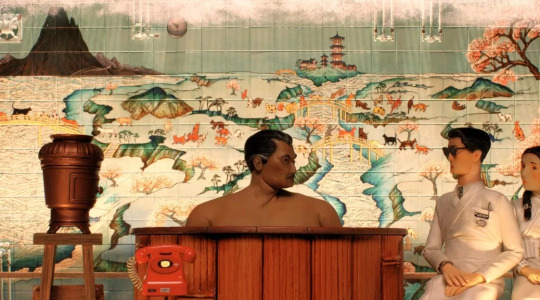
12. L’Île Aux Chiens (Wes Anderson)
Manquant, on ne sait par quel coup du sort, l’Oscar du meilleur film d’animation, L’Île Aux Chiens avait tout autant sa place dans les catégories « adultes ». Miracle en stop motion, Wes Anderson ne rogne sur aucun trait de son esthétisme qui pourtant se traduit toujours dans une photographie parfaite. Les décors de carton-pâte n’envient rien aux bains du Grand Hôtel Budapest ni aux soupentes des Tenenbaum. Une petite machine à rêver qu’il faut avoir vu, rassemblant ce pouvoir rassérénant d’Anderson avec un peu de la magie Gondry-ienne en plus…
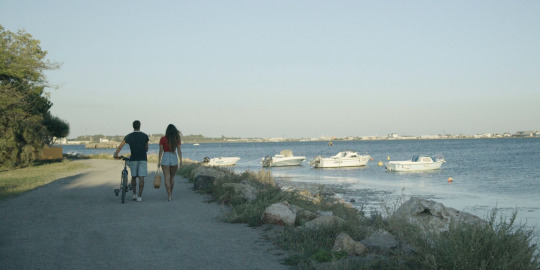
11. Mektoub, My Love : Canto Uno (Abdellatif Kechiche)
Comme un mauvais amant auprès duquel on retourne toujours sans vraiment savoir pourquoi, Kechiche captive et émeut autant qu’il agace et désespère. Tandis que Mektoub, My Love… peine à dissimuler les obsessions malsaines de son réalisateur pour les fesses bien pleines et les décolletés débordant de vie, il est aussi un indéniable bijou de réalisation. Sa caméra, douée de magie syncrétique, est tout aussi capable de nous faire sentir le soleil des vacances et le sel sur la bouche que l’envie d’embrasser les lèvres maculées de sauce de tomate d’Adèle Exarchopoulos dans La Vie d’Adèle… Mais Kechiche, ici, a au moins l’élégance de se révéler et se dénuder un peu aussi à son tour, nous emmenant dans le sud de ses plus jeunes années.

10. Le Grand Bain (Gilles Lellouche)
Point n’est besoin je crois de ressasser le succès de Lellouche qui a fait cette année un splash fracassant avec son Grand Bain. Alors juste un mot à ce propos. A un Lellouche, vieux beau, fleuron fanfaronnant de la masculinité toxique qui s’est lové dans ce qu’on appelle parfois le « séducteur à la française », celui qui tient la porte et met des mains aux fesses, qui offre de fleurs et trompe sa femme, on avait appris à ne rien laisser passer. Et puis ce film, défaisant avec minutie et délicatesse tous les poncifs sur l’homme dans la fleur de l’âge. Cet homme-là justement, le plus frappé par le suicide, car on a désappris à l’entendre pleurer, c’est lui que Lellouche nous offre. Male tears ? Ou vraies larmes d’hommes qui remplissent à ras-bord cette piscine où on s’entraîne à flotter lorsqu’on n’a plus pied. Un regret cependant, Alban Ivanov et Balsingham Thamilchelvan, si beaux mais tout juste relégués au rang de gags de répétition…

9. Sauvage (Camille Vidal-Nacquet)
Quelques nuits dans les rues de Paris, à dormir avec Félix Maritaud sur les trottoirs, dans les bois, dans les toilettes de bar et les bras désespérés des clients de Léo, 22 ans, homme prostitué à la rue. Contrairement à ses collègues du Bois, il ne cherche pas l’argent facile, qu’il pourrait trouver dans la poche d’un client évanoui ou dans celle d’un sugar daddy aimant. Jeune enfant loup, il trouve sa place dans un trou de terre à même le sol, le goût de son propre sang et les longues nuits de bitumes. Quand il est arraché à la rue pour quelques temps, une nuit, un jour, un répit, il ne retrouve plus son odeur ni celle de sa meute et alors comme un fou la piste jusque dans les recoins les plus sombre de ce métier sordide. Quelques nuits dans les rues de Paris où les prostitué.e.s, les hommes, les femmes, les trans, les migrants, les enfants, monnaient un bout d’eux-mêmes pour un billet froissé.
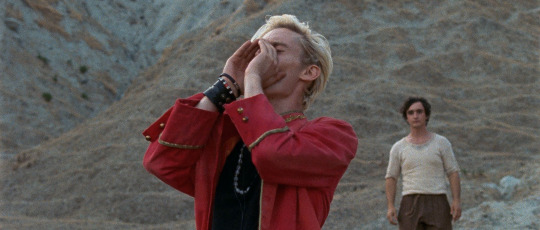
8. Heureux Comme Lazzaro (Alice Rohrwacher)
Etrange fable que celle racontée par Alice Rohrwacher. On ne sait si elle dit la violence du monde moderne et la nostalgie d’une innocence dorée ou au contraire l’immuable règle qu’est celle de l’oppression des forts sur les faibles. Elle déroule en tous cas un kaléidoscope lyrique à l’image de ces veilleuses d’enfants qui projetaient des formes exagérées aux murs et aux plafonds. La première partie se tourne avec une pureté et une luminosité incroyables, dans l’Italie rurale des années 80 (1980 ou 1880 ?) tandis que la seconde tient presque du reportage tant elle est grise et crue. On en sort séduit et dans un état un peu second, la grande machine du cinéma nous montre, une fois encore, l’implacable roue capitaliste broyant l’immortel ouvrier-poète italien.

7. En Liberté (Pierre Salvadori)
On retrouve ici le dialoguiste de génie, avec un quelque chose du vaudeville Veberien en plus. Salvadori recycle le motif du flic ripoux dans toute sa splendeur, en abusant du cliché avec un Vincent Elbaz qu’on n’avait plus trouvé aussi drôle depuis Dov Mimran. Le récit à tiroir est complètement maîtrisé, de même que les ingérables Pio Marmaï et Adèle Haennel. On a accusé, à raison, le film d’être brouillon et peu soigné dans la photographie. Oui, et alors ? Le rythme est parfait, les acteurs font ce qu’ils font de mieux chacun dans leurs marques sans se marcher dessus (et c’est un exploit). Le tout est arrosé d’une romance un peu malaisante entre Yvonne et Louis mais celle-ci nous sauve d’une fin cochonne où l’héroïne aurait fini avec le voyou enfin repenti. Gag après gag, une comédie à la française, mais dans ce qu’elle avait, jadis, de plus noble.

6. Capharnaüm (Nadine Labaki)
L’Occident est-il à ce point cynique pour acclamer une œuvre qui dévoile place la pauvreté sous une lumière si crue et de l’autre main fermer toutes ses écoutilles à celle qui se presse à ses portes ? Le Liban, déjà rongé par une pauvreté alarmante, une fracture sociale jamais égalée en termes de complexité et un voisinage peu commode, a accueilli près de 1,5M de réfugiés fuyant les zones de conflits alentours. C’est cette société tenant au chatterton que Nadine Labaki montre avec sa délicatesse et son chien accoutumés. Capharnaüm est un véritable coup de poignard en plein cœur porté par un petit casting virtuose. Zain Al Rafeea, tiré des rues de Beyrouth et la magnifique Yordanos Shiferaw se donnent la réplique en égaux et en partenaires. Tout fonctionne si bien. Tout est si beau. Tout nous ramène à notre coupable immobilité.

5. The Charmer (Milad Alami)
Il y a quelque chose du crime de lèse-majesté dans la présence du très jeune Alami aussi haut dans ce classement et surtout si loin devant son éminent patriote et aîné, le très grand Asghar Farhadi. Les deux compères font en tous cas honneur au cinéma iranien, et c’est un peu comme si le facétieux Abbas Kiarostami était toujours avec nous. The Charmer prend les accents glacés du thriller danois en gardant de cette rigueur réaliste caractéristique du cinéma iranien, toujours très proche du drame social mais jamais dans le pathos. On est intrigués, séduits, touchés puis tout simplement soufflés par le personnage d’Esmaïl, troublant amant immigré qui se raccroche aux draps des danoises pour ne pas sombrer. Mais un terrible ressort dramatique se distend soudain et c’est la chute, où Esmaïl nous emporte avec lui.

4. Suspiria (Luca Guadagnino)
Deux entrées en top 5 pour Luca Guadagnino cette année dont Suspiria qui parle à notre âme d’apprentie sorcière comme le démon susurre aux oreilles des vilaines filles. Toujours très amouraché, et à raison, de Tilda Swinton, Guadagnino fait le choix un peu déconcertant de Dakota Johnson en rôle central. On regrette de ne pas pouvoir profiter un peu plus de Chloe Moretz à l’écran mais le film est si beau et viscéral que tous les choix finissent par s’aligner d’eux-mêmes. Les ajouts de Guadagnino par rapport à l’original de Dario Argento sont aussi parfaitement maîtrisés recréant une toute autre dimension symbolique et esthétique.
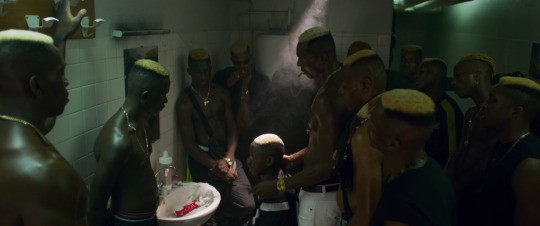
3. Le Monde est A Toi (Romain Gavras)
Fils de et lascar VIP du collectif Kourtrajme, Romain Gavras impose son style avec Le Monde est à Toi. Moitié hooligan, moitié enfant-roi, Gavras Jr fait des films comme on organise des soirées. Dans une interview en go-fast sur Vice, et dans la vraie lignée des hackers de Kourtrajme, il raconte en complète transparence la recette de la soupe au caillou. La contrainte financière le pousse par exemple à tourner à Benidorm, la ville la plus cheap d’Europe, d’une tour grandiose et hideuse à une autre, passage d’une banlieue parisienne à une station balnéaire sans âme de l’immonde côte espagnole, « Miami en nul ». Et à l’ombre des monstres, Cassel toujours solide, Adjani lunaire, Damiens fidèle à lui-même, le petit Karim Leklou parvient tout de même à se frayer une belle place au soleil. Le film est à la fois sublime et grotesque, baddass et fleur bleue, tirant sur toutes les ambulances, des migrants aux jeunes de banlieue, sans pitié ni cruauté, mais sans jamais rater sa cible.
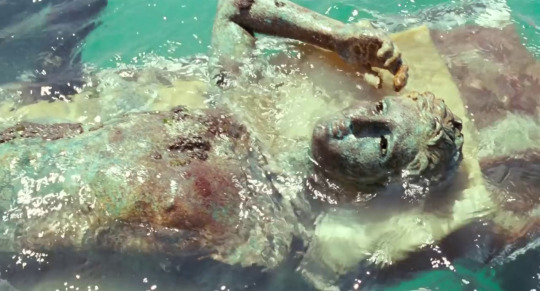
2. Call me By Your Name (Luca Guadagnino)
Luca Guadagnino a volé mon cœur cette année. Peut-être trop académique parfois, et notamment dans sa photographie et son déroulé narratif, Call Me By Your Name bénéficie tout de même d’une fraîcheur qu’on ne sait à qui attribuer, aux décors piochés dans nos meilleurs souvenirs de vacances ou à la sensualité des deux acteurs principaux… Sauvant Armie Hammer de son destin de beau gosse de blockbuster et révélant le sublime Timothée Chalamet, Call me By Your Name a aussi fait exploser les compteurs touristiques de la petite région du Monte Cremasco (que l’on recommande chaudement). L’envie de faire du vélo dans les rues de Crema, d’acheter un palais à Moscazzano ou de se baigner dans les laghetti qui ponctuent le Fiume Serio… Mais surtout de revivre son plus grand chagrin d’amour et de croquer à nouveau dans le fruit juteux des premières fois…

1. Au Poste ! (Quentin Dupieux)
Comme à chaque fois qu’il reprend son tablier de réalisateur Mr Oizo enflamme le dancefloor du cinéma français. Dans un paysage de la comédie française en plein naufrage, Dupieux est un phare constamment allumé. Au Poste ! est plus drôle que Wrong Cops, plus conceptuel que Rubber et encore plus intelligent que Réalité, c’est ce type de film qui nous fait aimer le cinéma. Avec les caméos complètement délirants de Michel Hazanavicius à Orlesan en passant par Chabat qui boucle une spirale infernale avec Réalité… Dupieux montre qu’il sait s’entourer. Sublimant un Poelvoorde en perte de vitesse et un Ludig complètement inattendu, le film explore les univers personnels de son auteur : le poste de police, le récit enchâssé, le discours rapporté et le langage performatif… Absurde et d’une intelligibilité extrême tout à la fois, on retrouve bien notre réal-DJ préféré. Dans une ambiance toujours feutrée et à la gamme chromatique soignée, Quentin Dupieux confirme qu’il est vraiment le Lynch de l’humour.
Et comme la dernière fois : le classement complet.
1 note
·
View note
Text
Chorus - 03
From: Antigone, by Sophocles
Genre: Drama
Topic: Gods
Character: Male; many characters as one
Truly blessed are those who have not tasted evil, For to them whose house is shaken by the gods, No species of madness is left out, creeping over the Majority of the family – Like the swell of the salt sea when The sea’s darkness runs angry upon Thracian winds, It churns up murky sand From the deep and the storm – swept Promontories, beaten by the opposing waves, roar with lamentation.
I see that the old woes of the house of The Labdacids add to the woes of the dead, Nor does the new generation deliver its race, but one of the gods throws them down. They have no release, for now light has fallen on The last root of the house of Oedipus. Bloody ashes of the lower gods Now mow her down in turn, Along with the folly of argument and fury of wits.
O Zeus, what human transgression Could limit your power? All – catching Sleep never takes it, Nor the unwearied months of the gods, But as never – decaying master, You hold the brilliant radiance of Olympus. The law will prevail, In time that is, time to come, As in all time past. Nothing comes assuredly To every mortal life – nothing but the rush to ruin.
For indeed wide – ranging hope Is a blessing to many men, But to many also a trick of light – minded desires. It comes to one who knows nothing Until he burns his foot Walking in hot fire. Hence the old saying still shows its wisdom: Sometimes the bad seems good To one whose wits God leads to madness. He will last a short time without ruin.
But here is Haemon, the last and youngest Of your children! Does he come In grief for the fate of his Intended bride, the maiden Antigone, In mourning for the bed he was cheated out of?
#monologue#monologues#theatre#theater#plays#play#acting#act#auditions#auditioning#greek#drama#antigone#sophocles#male
1 note
·
View note